Dandruff and an itchy scalp are two common conditions that can often occur together. But it's important to understand the difference between the two to effectively treat them. In this blog post, we'll take a look at the causes, symptoms, and treatments for itchy scalp and dandruff, as well as some tips for managing these conditions.
What is the difference between itchy scalp and dandruff?
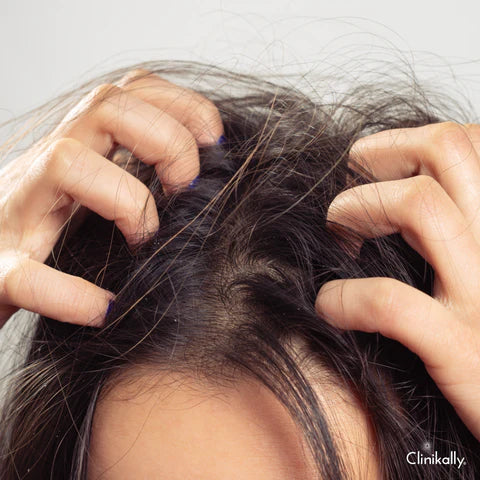
Itchy scalp and dandruff are two separate conditions, but they can often occur together. An itchy scalp is characterised by a persistent or intermittent itching sensation, while dandruff is characterised by the presence of white or yellow flakes on the scalp.
Identifying itchy scalp triggers
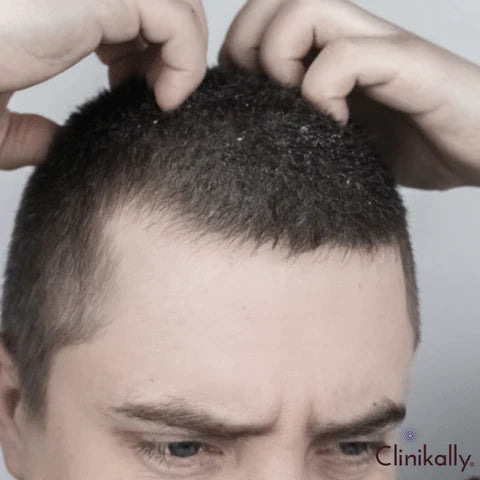
Identifying the causes of an itchy scalp can help you manage and prevent discomfort. Here are some examples of common triggers:
-
Dry Skin: A common cause of itching is a dry scalp. Cold weather, low humidity, harsh shampoos, or excessive washing can deplete the scalp's natural oils, resulting in dryness and itchiness.
-
Dandruff (Seborrheic Dermatitis): A common condition that causes flaky skin on the scalp and itching. It is frequently accompanied by redness and, on occasion, greasy patches.
-
Contact Dermatitis: Allergic reactions to hair care products (shampoos, conditioners, hair dyes, styling products) or specific fabrics from hats or headgear can cause irritation and itching.
-
Scalp Psoriasis: An autoimmune condition that causes a rapid turnover of skin cells, resulting in the formation of thick, red, scaly patches on the scalp that can be itchy and sometimes painful.
-
Fungal Infections: Fungal infections such as ringworm (tinea capitis) can affect the scalp, causing itching, redness, and sometimes hair loss.
-
Allergies: Allergies to certain foods, medications, or environmental factors can manifest as scalp itchiness.
-
Excessive Heat or Sweating: Prolonged exposure to heat or excessive sweating can lead to scalp irritation and itching.
-
Stress and Anxiety: Emotional stress and anxiety can exacerbate scalp conditions or trigger itching due to the body's response to stress hormones.
Consider the following steps to identify specific causes of itchy scalp:
-
Maintain a Journal: Keep track of when the itching occurs, the products you use, and any environmental factors or activities that occurred before the onset of itching.
-
Elimination Diet (if you suspect food allergies): If you suspect that certain foods are causing scalp itchiness, try removing them from your diet one at a time to see if there is a link.
-
Patch Testing: If you suspect an allergic reaction to hair care products, consider patch testing. This involves applying small amounts of product to a small area of skin (such as behind the ear) to see if it causes a reaction.
-
Consult a Dermatologist: If the itching persists or becomes severe, seek the advice of a dermatologist or other healthcare professional for an accurate diagnosis and personalised treatment plan.
After you've determined what triggers them, take steps to minimise or prevent exposure to them. Scalp itching can be lessened by using mild, hypoallergenic hair care products, practicing proper scalp hygiene, controlling stress, and getting the right medical attention, depending on the underlying cause.
Dandruff characteristics and identification
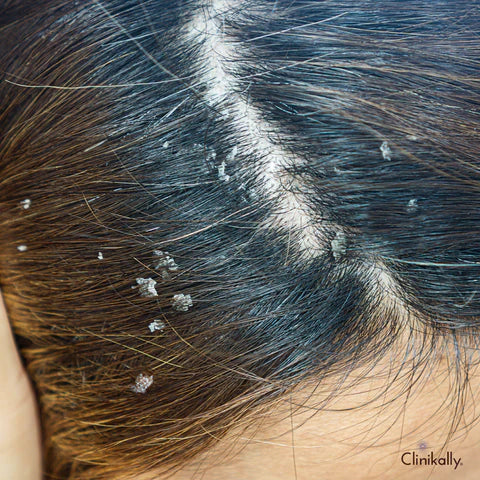
Dandruff is a common scalp condition characterised by the appearance of white or yellowish flakes of dead skin on the scalp and in the hair. These flakes are frequently seen on the shoulders or clothing. Itching and irritation are possible side effects. The following are the characteristics and signs of dandruff:
-
Flaky Skin: The presence of white or yellowish flakes on the scalp and in the hair is the primary symptom of dandruff. These flakes can be small or relatively large, depending on the severity of the condition.
-
Itching: Scalp itching is often associated with dandruff. Itching can range from mild to severe, and scratching may aggravate the condition.
-
Dryness or Oiliness: Dandruff can occur in people who have both dry and oily scalps. It may be associated with dryness for some, while it may be associated with oily or greasy scalp conditions for others.
-
Redness: The scalp may occasionally seem red or inflamed, particularly if dandruff is accompanied by other illnesses like psoriasis or seborrheic dermatitis.
-
Scalp Scales: Dandruff can appear as small, dry flakes or as larger, greasy scales. The flakes may be more visible when combing or brushing the hair.
-
Location on Scalp: Although dandruff can appear anywhere on the scalp, it is most frequently on the hairline and the top of the head.
-
Recurrent Nature: Dandruff frequently has periods of improvement and exacerbation, making it a chronic or recurrent condition.
Despite being a common issue, dandruff can occasionally be mistaken for other conditions affecting the scalp, such as fungal infections, psoriasis, or seborrheic dermatitis. If the symptoms worsen, last longer, or are accompanied by extreme redness, swelling, or discomfort, consult a dermatologist or other healthcare provider for an accurate diagnosis and the best course of treatment.
Causes of itchy scalp and dandruff
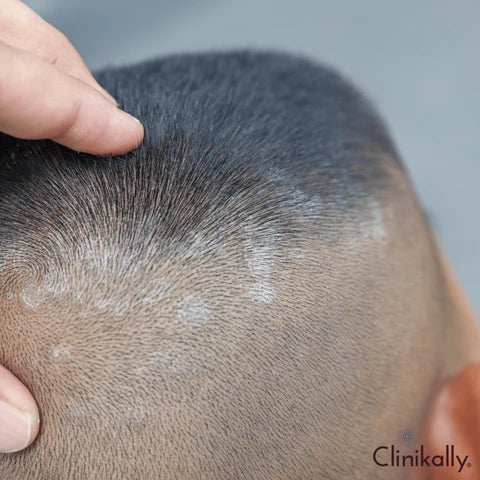
Dandruff and itchy scalp can be caused by a variety of factors, including:
-
Dry skin: Dry skin can cause itching and flaking of the scalp.
-
Fungal infection: A fungal infection, such as Malassezia, can cause dandruff and an itchy scalp.
-
Seborrheic dermatitis: This condition is characterised by red, scaly patches on the scalp and can cause both dandruff and itching.
-
Contact dermatitis: This occurs when an irritant or allergen comes into contact with the scalp, causing itching and flaking.
-
Hormonal changes: Hormonal changes, such as those that occur during pregnancy or menopause, can cause an itchy scalp and dandruff.
-
Certain medical conditions: Certain medical conditions, such as psoriasis and eczema, can cause an itchy scalp and dandruff.
-
Hair care products: Some hair care products, such as shampoos, conditioners, and styling products, can cause an itchy scalp and dandruff.
If you're concerned about excessive itching and hair fall conditions, don't hesitate to consult a doctor. At Clinikally, you can book an online dermatologist consultation at your chosen time, hassle-free. They can look at and give an accurate diagnosis of your scalp condition and recommend personalized hair care treatment plans for you.
Environmental factors contributing to scalp issues

Several environmental factors can aggravate scalp problems, exacerbating symptoms such as dandruff, itching, dryness, or irritation. These elements are as follows:
-
Climate and Weather Conditions: Weather changes, particularly extreme temperatures and humidity fluctuations, can have an impact on the scalp. Cold, dry weather can cause dry scalp, whereas hot, humid weather can aggravate oiliness or contribute to sweat-related scalp issues.
-
Excessive Heat Styling: Using heat-styling tools like blow dryers, straighteners, or curling irons regularly can strip the scalp of natural oils, causing dryness, irritation, and, in some cases, dandruff.
-
Hard Water: Water with a high mineral content, also known as hard water, can leave mineral deposits on the scalp, causing dryness, itching, and irritation.
-
Sun Exposure: Prolonged sun exposure can damage the scalp, causing dryness, sunburn, and possibly contributing to scalp conditions.
-
Chemicals in Hair Products: Harsh chemicals in hair care products, such as sulphates, parabens, or fragrances, can irritate the scalp and contribute to dandruff, itching, or dermatitis.
-
Allergens and Irritants: Particles of pollution, dust, mould, pollen, and other environmental allergens can land on the scalp and cause allergic reactions or irritation.
-
Headgear and Accessories: Using hair bands or clips that tug on the scalp, or wearing tight headgear, hats, or helmets can all result in friction, irritation, and occasionally folliculitis (inflammation of the hair follicles).
-
Chemical Exposures: Working in manufacturing or industrial environments, for example, or being exposed to certain chemicals in the environment can irritate the scalp and cause it to become dry, itchy, or react allergicly.
-
Poor Air Quality: Residing in high-pollution areas exposes the scalp to airborne pollutants and potentially irritating particles, which can aggravate scalp conditions.
-
Stress and Lifestyle: Environmental stressors, which also include lifestyle factors like inadequate sleep, a poor diet, and high levels of stress, can have an impact on an individual's overall health, which includes the health of their scalp.
Scalp problems can be managed and prevented by being aware of them and taking steps to mitigate their effects. These actions include using gentle hair care products, shielding the scalp from harsh weather, practising good scalp hygiene, and leading a healthy lifestyle. It is recommended to consult a dermatologist for an accurate diagnosis and treatment if scalp issues continue or worsen despite these measures.
Role of diet and lifestyle in scalp health

Diet and lifestyle choices have a significant impact on overall health, as well as scalp health. Several dietary and lifestyle factors can have an impact on scalp condition:
-
Nutrient Intake: A diet rich in essential nutrients such as vitamins (A, B, C, D, and E), minerals (zinc, iron), and omega-3 fatty acids promote healthy hair and scalp. These nutrient deficiencies can contribute to dryness, flakiness, and hair loss.
-
Hydration: Staying hydrated is important for overall health, including scalp health. Dehydration can cause a dry scalp, which is more susceptible to irritation and dandruff.
-
Fatty Acids: Omega-3 fatty acids, which can be found in foods such as fish, flaxseeds, and walnuts, can help reduce inflammation and promote a healthy scalp.
-
Antioxidants: Antioxidant-rich foods (such as fruits and vegetables) aid in the prevention of oxidative stress, which can harm the scalp and hair.
-
Protein Intake: Because hair is primarily composed of protein, an adequate intake of protein sources such as lean meats, beans, and legumes promotes the health of hair follicles.
-
Healthy Fats: Including healthy fats from avocados, nuts, and seeds in your diet can help keep your skin and scalp moisturised.
-
Stress Management: Excessive stress can hurt overall health, including the scalp. Stress can aggravate scalp conditions such as dandruff or itching. Meditation, yoga, and regular exercise can all help with stress management.
-
Scalp Hygiene: Regular washing and cleansing of the scalp can help to prevent the buildup of oil, sweat, and environmental pollutants that can cause scalp problems.
-
Avoiding Smoking and Excessive Alcohol Consumption: Smoking and excessive alcohol consumption can hurt circulation and overall health, potentially affecting the scalp and hair health.
-
Inadequate Sleep: Inadequate sleep can disrupt the body's natural balance and affect overall health, including hair and scalp health. Getting enough quality sleep promotes overall health.
Maintaining a healthy lifestyle, including a nutrient-dense diet, staying hydrated, managing stress, and practising good scalp hygiene, are all important for supporting scalp health. Individual responses to dietary and lifestyle changes, on the other hand, can vary. If scalp issues persist despite lifestyle changes or become severe, seeking advice from a healthcare professional or dermatologist is recommended for proper diagnosis and treatment.
Symptoms of itchy scalp and dandruff
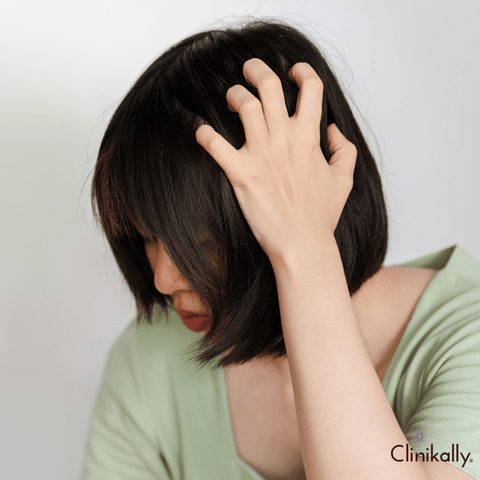
Dandruff and an itchy scalp can cause several symptoms, such as:
-
Itching: The most common symptom of an itchy scalp is a persistent or intermittent itching sensation.
-
Flaking: Dandruff is characterised by the presence of white or yellow flakes on the scalp.
-
Redness: The scalp may appear red and inflamed in some cases.
-
Hair loss: In some cases, an itchy scalp and dandruff can lead to hair loss.
It's crucial to remember that the degree and presentation of these symptoms can differ. If over-the-counter medications haven't relieved chronic or severe symptoms, people should think about seeing a dermatologist or other healthcare provider for an accurate diagnosis and course of therapy. Determining the root cause is essential to managing scalp problems effectively.
Recognizing early signs of scalp conditions
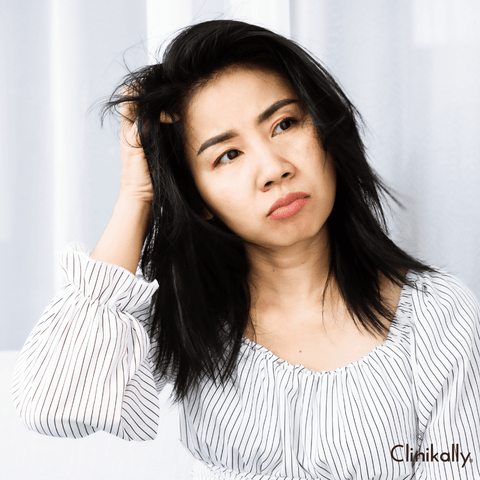
Recognising early signs of scalp conditions is critical for timely intervention and effective management. Some common early warning signs of various scalp conditions include:
-
Dryness: A dry scalp may feel tight, itchy, or rough. Flakiness or small white or greyish flakes appearing on the scalp and hair may indicate dryness.
-
Flaking: Scalp flaking could indicate a variety of conditions, including dandruff, seborrheic dermatitis, or scalp psoriasis. Dandruff typically appears as small, white or yellowish flakes.
-
Redness or Irritation on the Scalp: Red patches, inflammation, or irritation on the scalp may indicate seborrheic dermatitis or psoriasis. These conditions can cause itchiness and discomfort.
-
Oiliness: An overabundance of sebum or seborrheic dermatitis may be indicated by excessive oiliness or greasiness on the scalp, which may result in disorders like dandruff.
-
Scalp Bumps, Sores, or Pimples: These may be signs of many ailments, such as infections, folliculitis, or scalp acne.
-
Hair Changes: Alterations in the thickness, texture, or appearance of hair may occasionally be the first indications of conditions affecting the scalp. There may be a connection between underlying scalp problems and hair loss, thinning, or changes in the appearance or feel of hair.
-
Persistent Itching: In the early stages of a scalp condition, persistent itching that is not accompanied by visible flaking or redness may be indicative.
-
Unusual Sensations: Any unusual scalp sensations, such as burning, tingling, or tenderness, may be early signs of specific scalp problems.
-
Odour: Distasteful smells coming from the scalp, particularly in conjunction with other symptoms, may be signs of bacterial or fungal infections.
Early intervention or therapy may be necessary if these early warning signs and symptoms are identified. It's crucial to remember that there are many different types of scalp diseases, and some may even have identical symptoms. A dermatologist, trichologist, or other medical practitioner must do a proper diagnostic to accurately identify the state of the scalp and choose the best course of action. Early intervention frequently results in better scalp health outcomes and more efficient care.
When to seek medical advice for scalp issues

Seeking medical advice for scalp problems is recommended in a variety of situations, including:
- Persistent Symptoms: If scalp symptoms such as itching, flaking, redness, or irritation persist despite using over-the-counter treatments or home remedies, it is critical to consult a healthcare professional.
- Severe Discomfort or Pain: Severe itching, pain, burning sensations, or discomfort on the scalp may indicate an underlying issue that necessitates medical attention.
- Sudden Onset or Rapid Changes: If scalp problems appear or worsen suddenly, seek immediate medical attention.
- Visible Changes in Scalp Health: Scalp changes such as sudden hair loss, bald patches, unusual bumps, sores, or lesions should be evaluated by a doctor.
- Unexplained Scalp Conditions: Scalp conditions that do not respond to standard treatments or persist without a clear cause should be evaluated by a dermatologist or healthcare professional.
- Associated Symptoms: If scalp problems are accompanied by other symptoms such as fever, fatigue, swollen lymph nodes, or unusual rashes on other parts of the body, it may indicate an underlying systemic condition that necessitates medical attention.
- Chronic or Recurrent Conditions: Psoriasis, eczema, seborrheic dermatitis, chronic dandruff, and other recurring scalp conditions should all be treated under a doctor's supervision.
- Personal Concerns: Consulting a healthcare professional can offer both medical treatment and emotional support if scalp issues significantly disrupt daily life, negatively affect one's sense of self, or negatively impact one's emotional health.
Recall that a dermatologist or other medical specialist with expertise in scalp and hair diseases may correctly identify conditions of the scalp, recommend suitable courses of treatment, and provide advice on how to maintain and care for the scalp. Serious scalp problems should never be self-diagnosed or self-treated because doing so could make the problem worse or postpone receiving necessary medical attention. When it comes to treating scalp health issues, early intervention and appropriate management can frequently result in better outcomes.
Treatment for itchy scalp and dandruff

Dandruff and itchy scalp are usually treated with over-the-counter (OTC) medications, at-home care routines, and occasionally prescription medications. These are a few different therapy options:
#1 Over-the-counter dandruff shampoo: Shampoos containing ingredients such as coal tar, salicylic acid, or selenium sulphide can help reduce flaking and itching.
#2 Medicated shampoo: Your doctor may prescribe a medicated shampoo, such as those containing corticosteroids, to help reduce inflammation and itching.
#3 Topical antifungal cream: If a fungal infection is causing you dandruff and itchy scalp, your doctor may recommend a topical antifungal cream.
#4 Moisturising: Keeping your scalp moisturised can help reduce itching and flaking.
#5 Use gentle hair care products: Avoid using harsh hair care products, and instead opt for gentle, sulphate-free shampoos and conditioners.
To effectively manage dandruff and an itchy scalp, it is important to identify and prevent triggers and to follow the treatment plan consistently. Finding the best treatment for your scalp problem is crucial, as individual responses to therapies may differ.
Over-the-counter solutions vs. prescription treatments

Prescription medications and over-the-counter (OTC) remedies have distinct functions when it comes to treating scalp conditions. An outline of their variations is provided below:
Over-the-Counter (OTC) Solutions:
-
OTC solutions are widely available without a prescription and can be purchased at pharmacies, supermarkets, or online stores.
-
OTC treatments that are frequently used include shampoos, conditioners, creams, lotions, and foams that contain active ingredients such as coal tar, pyrithione zinc, salicylic acid, ketoconazole, selenium sulphide, or tea tree oil, among additional substances.
-
Over-the-counter treatments are generally appropriate for mild scalp issues such as mild dandruff, mild itching, or occasional flaking.
-
OTC products typically contain lower concentrations of active ingredients than prescription treatments. They may be effective for some people, but they may not be effective for more severe or chronic scalp conditions.
-
OTC solutions are usually less expensive than prescription treatments and are a good place to start when dealing with mild scalp issues.
Prescription Treatments:
-
These treatments are only available with a prescription from a dermatologist or other healthcare provider.
-
Prescription medications frequently include higher concentrations of active ingredients or different formulations that are more effective for severe or chronic scalp conditions.
-
They are recommended for more severe scalp conditions such as severe dandruff, psoriasis, seborrheic dermatitis, scalp infections, or conditions that do not respond to over-the-counter treatments.
-
To address underlying causes or systemic conditions affecting the scalp, oral medications or injections may be prescribed in some cases.
-
Due to the potency and potential side effects of prescription treatments, they may necessitate close monitoring by a healthcare professional.
When to Use Which:
-
Suitable for mild or occasional scalp issues, such as mild dandruff, itching, or mild dryness. They are inexpensive and simple to obtain.
-
Required in situations requiring greater potency, when systemic conditions impact the scalp, or for severe or persistent scalp conditions that do not respond to over-the-counter remedies. They need to be assessed and monitored by professionals.
Consult a dermatologist or healthcare provider for a proper diagnosis and advice on the best treatment option, whether OTC or prescription, based on the severity and specific nature of your scalp condition.
Shampoo ingredients effective against itchy scalp and dandruff
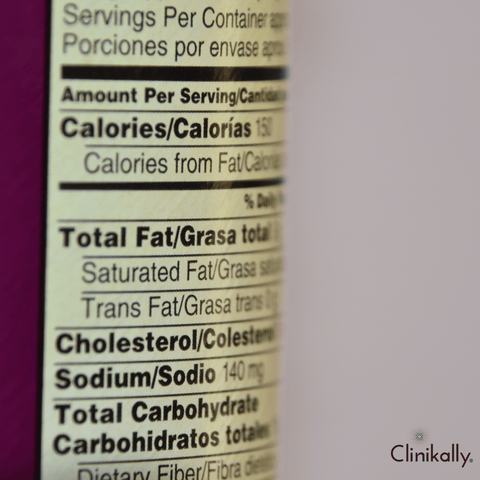
Several active ingredients in shampoo are effective against itchy scalps and dandruff. Look for shampoos that contain the following key ingredients when selecting a shampoo to address these issues:
-
Pyrithione Zinc: This antifungal agent inhibits the growth of Malassezia, a yeast-like fungus linked to dandruff. Pyrithione zinc shampoos can help relieve itching and flaking.
-
Salicylic Acid: This ingredient aids in scalp exfoliation by breaking down and removing dead skin cells. It works well for treating dandruff and alleviating scalp itching.
-
Coal Tar: Known for its antifungal and anti-inflammatory properties, coal tar reduces flaking and itching by slowing the rapid growth of skin cells on the scalp. It is commonly found in shampoos designed to treat psoriasis and dandruff.
-
Ketoconazole: An antifungal agent that effectively treats yeast-caused dandruff. Ketoconazole shampoos are available without a prescription as well as over-the-counter.
-
Selenium Sulphide: It works by slowing down skin cell production and reducing the Malassezia fungus. Shampoos containing selenium sulphide are effective at reducing dandruff and itching.
-
Tea Tree Oil: Tea tree oil, known for its natural antifungal and antibacterial properties, can help relieve scalp itching and dandruff. It is frequently found in organic or medicated shampoos.
-
Tar-based Shampoos: These shampoos contain varying concentrations of tar extracts, which are known for their anti-inflammatory and antifungal properties. They can effectively relieve scalp itching and flaking caused by conditions such as psoriasis or dandruff.
Consider your scalp condition, sensitivity to specific ingredients, and the severity of the problem when choosing a shampoo. It may also be beneficial to alternate between different active ingredients or to use a combination of products, as some ingredients may work better for specific individuals or conditions. You must use the shampoo product as prescribed and adhere to the label's instructions. It is best to see a dermatologist for a proper diagnosis and individualised treatment plan if your scalp problems continue even after using over-the-counter shampoos or if you have concerns about the health of your scalp.
Home remedies for itchy scalp and dandruff

Many natural treatments are available to relieve itchy scalps and manage dandruff. Here are a few sensible choices:
-
Apple cider vinegar: Mix equal parts apple cider vinegar and water, and use it as a final rinse after shampooing. This can help balance the pH of the scalp and reduce dandruff.
-
Tea tree oil: Mix a few drops of tea tree oil with a carrier oil such as coconut or olive oil, and massage it into your scalp. Leave it on for 15 minutes before shampooing. Tea tree oil has antifungal and anti-inflammatory properties, which can help reduce dandruff and itching.
-
Baking soda: Mix a small amount of baking soda with water to form a paste, and massage it into your scalp. Leave it on for a few minutes before shampooing. Baking soda can help remove dead skin cells and reduce dandruff.
-
Aloe vera: Apply aloe vera gel directly to your scalp and leave it on for 15-20 minutes before shampooing. Aloe vera can help soothe itching and reduce inflammation.
Do a patch test to make sure you are not allergic to any substances before utilising any of these cures. When using home remedies, consistency and patience are crucial because it could take some time to observe the benefits. For an accurate diagnosis and course of therapy, see a dermatologist if dandruff or itching worsens or persists.
Natural oils for scalp treatment

Natural oils are frequently used in scalp treatments because of their nourishing, calming, and moisturising qualities, which can be advantageous for the health of the scalp. Several natural oils that are frequently applied to the scalp include:
-
Coconut Oil: Well-known for its hydrating qualities, coconut oil helps lessen flakiness, itching, and dryness on the scalp. It may also improve the health of the scalp because of its antibacterial and antifungal qualities.
-
Tea tree oil: This essential oil naturally possesses anti-inflammatory, antifungal, and antibacterial qualities. It may be useful in the treatment of scalp infections, dandruff, and irritation.
-
Jojoba Oil: Jojoba oil moisturises the scalp without leaving a greasy residue and helps control oil production, much like the natural sebum produced by the scalp. It helps with conditions where the scalp is dry.
-
Argan Oil: Packed with fatty acids, vitamins, and antioxidants, argan oil helps hydrate the scalp, lessen inflammation, and encourage the growth of healthy hair.
-
Olive Oil: A rich source of hydration that can help reduce flakiness and dryness in the scalp. Its anti-inflammatory and antioxidant qualities promote the health of the scalp.
-
Castor Oil: Castor oil is known for its hair-strengthening properties and is high in fatty acids. It also has antimicrobial properties. It can nourish the scalp and encourage hair growth.
-
Almond Oil: Almond oil is lightweight and easily absorbed, making it ideal for scalp moisturization. It contains vitamins and minerals that are beneficial to the health of the scalp.
When applying natural oils to the scalp:
-
Dilution: To avoid skin irritation, some essential oils, such as tea tree oil, should be diluted with carrier oils before application. Always conduct a patch test to rule out allergies or sensitivities.
-
Application: To enhance circulation and encourage absorption, lightly massage the oil into the scalp. Before washing it off, let it stay on for a long enough amount of time (usually 30 minutes to overnight).
-
Consistency: Using natural oils regularly can continue to improve the health of your scalp. Individual responses may differ, so it is critical to find the right oil and application frequency for your scalp.
While natural oils can help with a variety of scalp issues, they may not be appropriate for everyone or every scalp condition. Consultation with a dermatologist or healthcare professional is recommended, especially if you have specific scalp concerns or conditions that require professional evaluation and treatment.
DIY scalp masks for itch relief and dandruff control
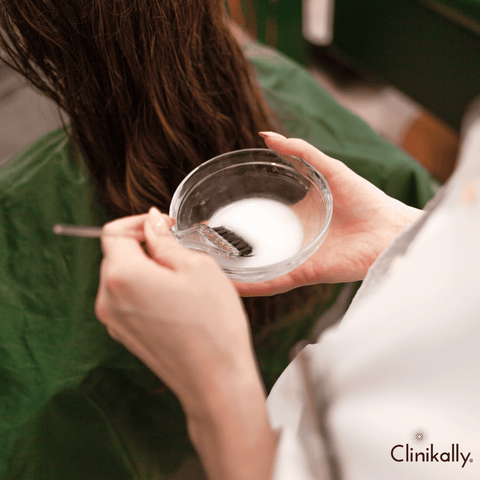
Making DIY scalp masks from natural ingredients can help relieve itching and control dandruff. Here are some homemade scalp mask recipes to try:
Coconut Oil and Tea Tree Oil Mask:
-
Ingredients: 5–10 drops of tea tree oil and 2 tablespoons of coconut oil
-
Instructions: Thoroughly combine the tea tree oil and coconut oil. Using your fingertips, apply the mixture to your scalp and give it a light massage. Leave it on for 20-30 minutes or overnight. Rinse well with a gentle shampoo.
-
Benefits: Coconut oil moisturises the scalp, while the antifungal and antibacterial properties of tea tree oil can help control dandruff and soothe itching.
Yoghurt and Lemon Juice Mask:
-
Ingredients: half a lemon's juice and ½ cup plain yoghurt.
-
Instructions: Blend yoghurt and lemon juice into a smooth paste. Massage your scalp gently after applying the mixture. After 20 to 30 minutes, turn it off. Rinse well with a gentle shampoo.
-
Benefits: The acidity of lemon juice can help reduce dandruff and itching, while yoghurt's probiotics can help balance the pH of the scalp.
Aloe Vera and Olive Oil Mask:
-
Ingredients: 1 tablespoon olive oil and 2 tablespoons aloe vera gel.
-
Instructions: Thoroughly mix the olive oil and aloe vera gel. Gently massage your scalp with the mixture after applying it. Leave it on for 30-45 minutes. Rinse well with a gentle shampoo.
-
Benefits: Aloe vera has anti-inflammatory properties that can relieve itching, while olive oil moisturises and nourishes the scalp.
Apple Cider Vinegar and Honey Mask:
-
Ingredients: 1 tablespoon honey and 2 tablespoons apple cider vinegar
-
Instructions: Blend the honey and apple cider vinegar thoroughly. Gently massage your scalp with the mixture after applying it. Turn it on for ten to fifteen minutes. Rinse well with a gentle shampoo.
-
Benefits: Honey's antibacterial qualities can help soothe the scalp, and apple cider vinegar helps balance the pH of the scalp and control dandruff.
It's crucial to perform a patch test to rule out any allergies or ingredient sensitivities before using any homemade scalp mask. Furthermore, not every scalp problem can benefit from these natural therapies, even though they can help a lot of people. For an accurate diagnosis and course of therapy, it is advised to consult a dermatologist or other healthcare provider if scalp problems continue or get worse.
Preventative measures for maintaining scalp health

Sustaining the health of the scalp requires a range of proactive steps and appropriate techniques. Regular cleaning, massaging the scalp, staying properly hydrated, eating a balanced diet, avoiding harsh chemicals, using protective styling, limiting heat styling, protecting the sun, managing stress, getting regular trims, using products for a healthy scalp, avoiding overwashing, and consulting a professional are some tips for keeping a healthy scalp. You can support healthy hair development, maintain a healthy scalp, and improve overall scalp health by adding these preventative steps into your hair care regimen.
Long-term strategies for dandruff management
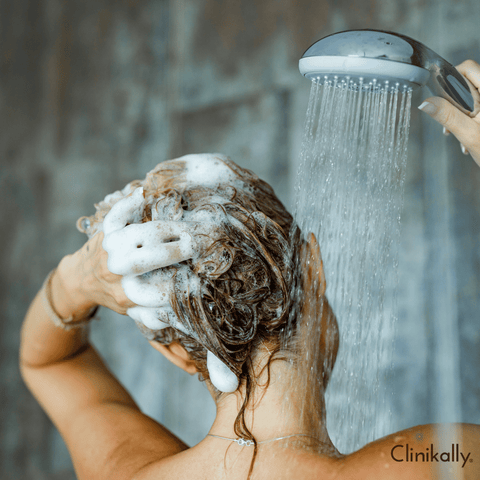
Managing dandruff necessitates a consistent, long-term approach. Here are some long-term dandruff management strategies that work:
-
Anti-Dandruff Shampoos: Look for shampoos that contain active ingredients such as pyrithione zinc, salicylic acid, ketoconazole, selenium sulphide, coal tar, or tea tree oil. Use them regularly to control dandruff and flaking.
-
Regular washing: Use an anti-dandruff shampoo regularly to prevent the buildup of oil, dead skin cells, and Malassezia yeast on the scalp, all of which contribute to dandruff.
-
Massage and Proper Rinsing: When shampooing, massage the scalp gently to improve circulation and ensure thorough cleansing. Rinse your hair and scalp thoroughly to remove any shampoo residue.
-
Alternate Shampoos: To prevent the scalp from becoming resistant to one ingredient, alternate between different anti-dandruff shampoos with different active ingredients.
-
Follow Instructions: Follow the anti-dandruff shampoo label's application frequency and duration instructions. Some shampoos may require a few minutes of application before rinsing.
-
Maintain Scalp Hygiene: Keep your scalp clean and maintain good scalp hygiene to reduce the buildup of dead skin cells, oil, and bacteria that can aggravate dandruff.
-
Avoid Triggers: Recognise and avoid dandruff-causing triggers such as stress, specific hair care products, excessive heat styling, or dietary factors that may contribute to scalp irritation.
-
Balanced Diet: Eat a nutritious diet rich in vitamins and minerals that promote scalp health. Avoid eating too many sugary or processed foods, which can aggravate dandruff.
-
Scalp Moisturization: To moisturise and soothe a dry scalp, use conditioners or natural oils such as coconut oil or jojoba oil. If you have an oily scalp, however, avoid using oils.
-
Manage Stress: Stress can aggravate dandruff, so try stress-reduction techniques like yoga, meditation, or mindfulness.
-
Professional Advice: Consult a dermatologist or healthcare professional if dandruff persists despite using over-the-counter treatments or if it is severe and causing significant discomfort or embarrassment. They can make an accurate diagnosis and, if necessary, prescribe stronger treatments.
Consistently following these long-term strategies is critical to effectively managing dandruff. Individual responses to treatments may vary, even though these measures can significantly reduce dandruff symptoms. Depending on your scalp's specific needs, changes to your hair care routines or treatment approaches may be required.
Say goodbye to itchy scalp and dandruff
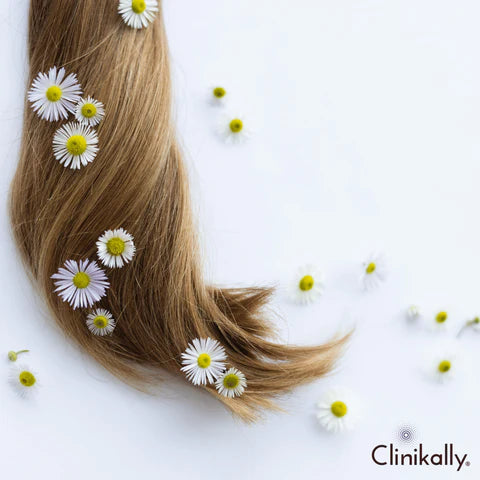
Itchy scalp and dandruff are two common conditions that can often occur together. Understanding the difference between the two is important in order to effectively treat them. Dry skin, fungal infection, seborrheic dermatitis, contact dermatitis, hormonal changes, certain medical conditions and hair care products are some of the causes of itchy scalp and dandruff. Symptoms of itchy scalp and dandruff are itching, flaking, redness, and hair loss. Over-the-counter dandruff shampoo, medicated shampoo, topical antifungal cream, moisturising and using gentle hair care products are some of the treatment options. Home remedies like Apple cider vinegar, tea tree oil, baking soda, and aloe vera gel are also effective in treating itchy scalp and dandruff. Consult with a dermatologist if you have severe symptoms or if your symptoms persist even after trying home remedies.
































